Bloat in Great Danes is deadly. It’s painful, dangerous, and as many as 1-in-4 Great Danes are likely to experience it in their lifetime.
For decades now, people have cited that resting after meals would prevent bloat from happening.
The occurrence of bloat in large and giant breed dogs has increased dramatically in the last decades, despite ‘resting after meals’ being cited as the most common preventative.
I mean, I hate to say this…but it’s pretty clear here that resting after meals is not working.
Not only that, but research has emerged which indicates that moderate movement after meals may actually help prevent Great Danes from developing bloat!
In other words, have people had this all wrong? Have we actually been increasing our dogs risk of bloat by diligently resting them after meals?
Oh…dear.
Before we dig in, if you need a refresher on what bloat is in dogs, read HERE.
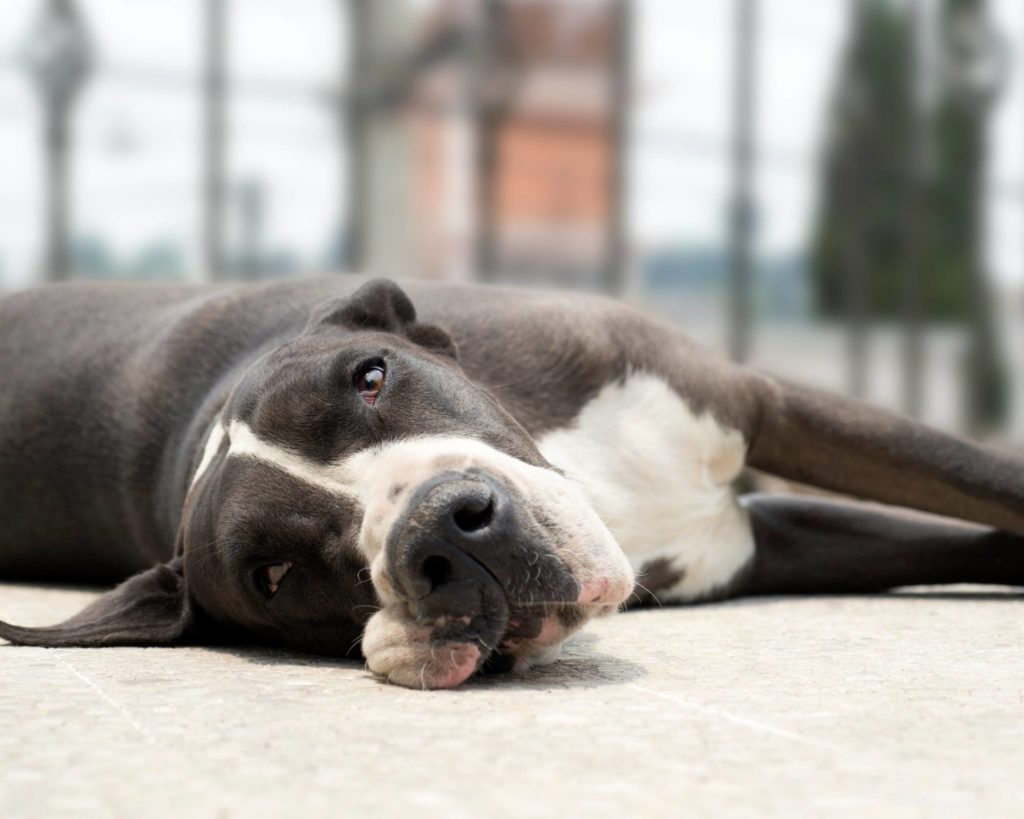
Does Resting After Meals Prevent Dog Stomach Bloat?
We’ve been reading journals and publications for a while, and it’s actually fascinating to learn that there is absolutely NO research or science (that we’ve found) proving that resting after meals prevents bloat.
As a matter of fact, I have yet to find anything that shows that it could even reduce the risk of bloat.
Of course, if you google this, there are 100’s of blogs and social media posts, even from veterinarians, who say that large and giant breed dogs should always rest after meals.
But none of it is backed by science, research, or data.
It’s all anecdotal. Speculation.
The Great Dane community has eaten this up, too. Some people are so dedicated to resting their dogs that they do so for an entire hour before meals and two hours after.
Imagine the heartbreak when their dog experiences deadly bloat and torsion despite the caution that had been taken.
It happens more often than you might think…
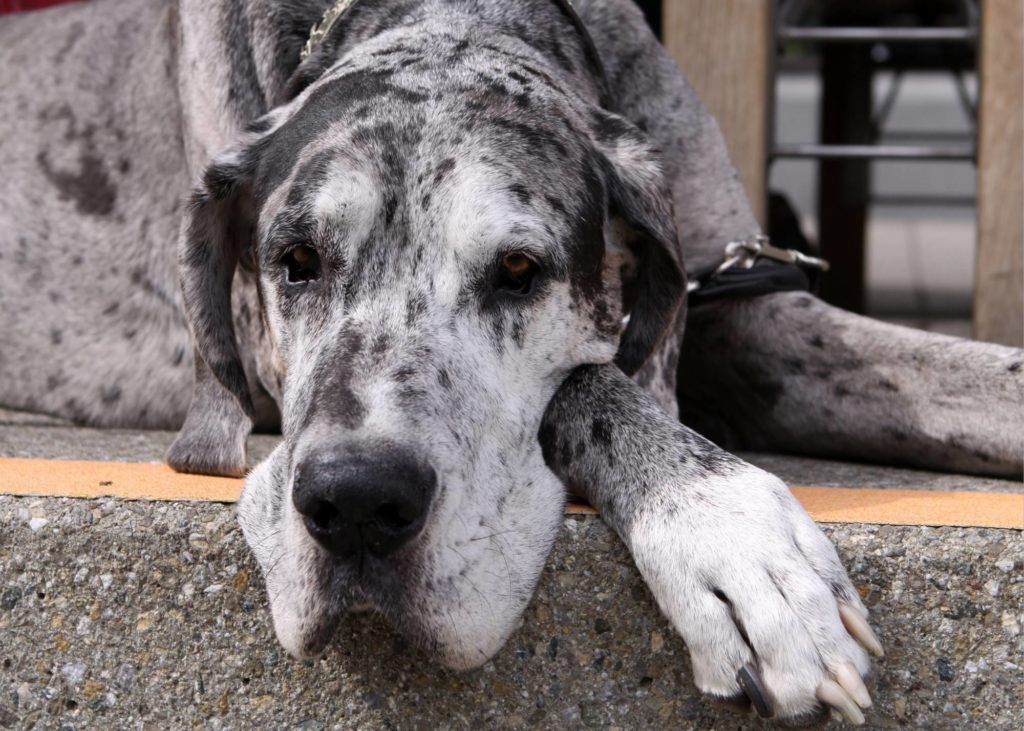
Should Great Danes Rest After Meals?
We’re going to take a scientific, although controversial approach to this and make a statement that may rattle everything you think you know about keeping Great Danes safe from GDV bloat and torsion.
The practice of resting dogs after meals to prevent bloat is hopelessly outdated and may actually contribute to higher bloat risk.
A 2013 study, done as part of ongoing bloat research, found something alarming and interesting.
Dogs that received moderate exercise (for example a walk or playtime) after eating were less likely to suffer from bloat!
This is the exact opposite of what we’ve all been told for decades.
Combing through the 2,551 questionnaire responses, what the researchers found is that moderate physical activity after eating, including playing with other dogs or “running the fence,” appears to reduce the chance for developing bloat by almost half.
Tufts University Your Dog
Read that again.
Moderate exercise, including running the fence and playing, may reduce the chances of bloat by 50%!!!
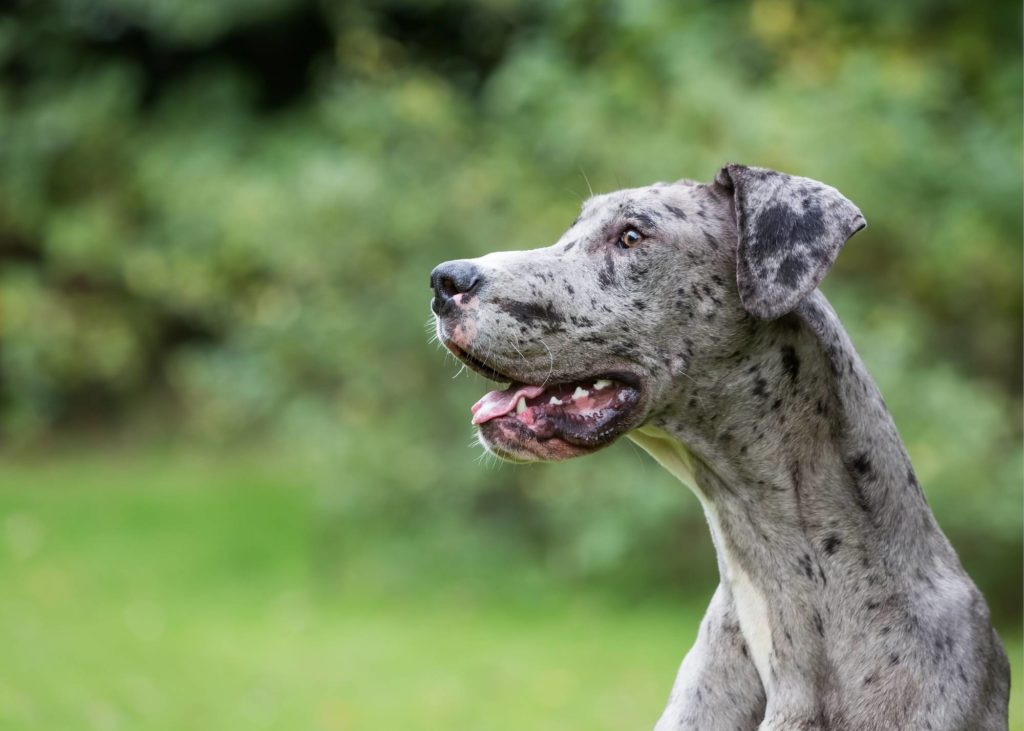
Does Exercise Cause Bloat in Dogs?
It’s been said for years that dogs who exercise on a full tummy can get bloat and end up at the veterinarian in dire straits. As we can see from the research, this issue isn’t quite so cut and dry.
To further back up our claim that resting after meals is outdated and even wildly inaccurate advice, I’m looking towards another study that was done by Tufts University. (Remember, we like science here, not anecdotes).
Several popular theories regarding bloat were not substantiated during the study. There was no correlation of bloat risk to exercise before or after eating, as most dogs bloated in the middle of the night with an empty, gas-filled stomach.
Tufts University Bloat Research
In other words, not only have they found that moderate exercise after eating can potentially cut bloat risk in half, they found that movement has no correlation to bloat occurring.
Food and movement are not the enemy that they’ve been made out to be!
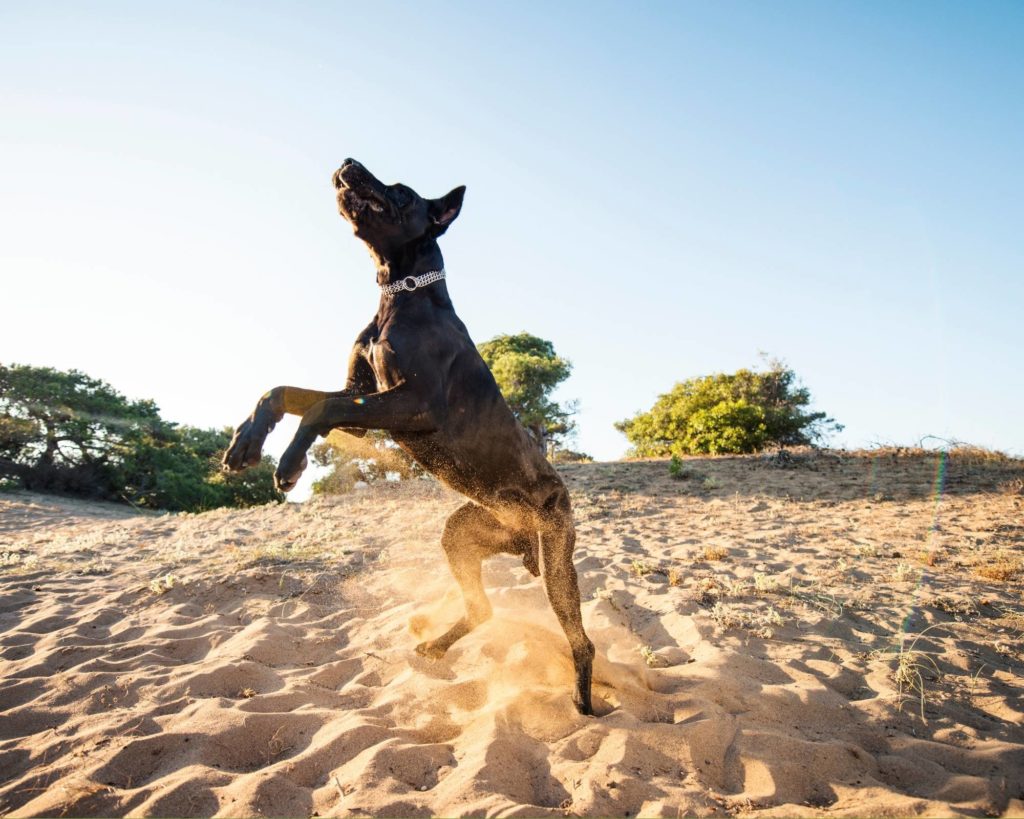
Common Sense for Bloat in Great Danes Prevention
This is not to say that you should feed your Great Dane a big fat meal and send them off-leash on a wild adventure.
Humans don’t like hard exercise on a super full stomach, either. Doing this can also stretch the hepatogastric ligament, which over time might increase bloat risk as a whole.
Great Danes should never be fed single large meals. Smaller, more frequent meals are healthier.
So let’s use some common sense here when it comes to bloat prevention in Great Danes and other large or giant breed dogs.
Feed a normal sized meal (we recommend 2-3 meals each day) and then let your dog be a dog.
Because bloat risk is affected by many factors, I’ll outline some other (science-backed) risk reduction techniques below.
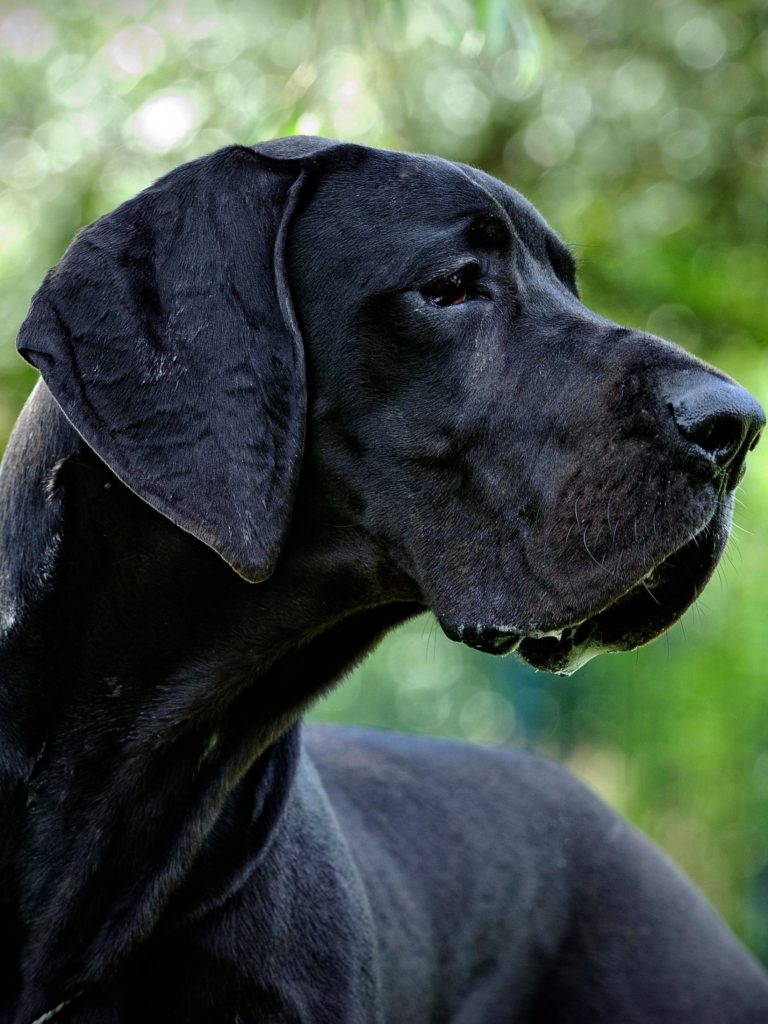
How to Prevent Bloat in Great Danes
Prevention is a misnomer. You cannot prevent it from occurring. You can, however, drastically reduce the chance that your Great Dane has bloat or dies from it.
Bloat in Great Danes are influenced by three major factors: genetics, temperament, and gut health.
All Great Danes are at risk. However, Great Danes with the highest risk of getting (and dying from) bloat include Danes that:
- Have a 1st degree relative that got bloat
- Are timid, unsure, flighty, aggressive, nippy, anxious, or unstable
- Have poor gut health, including chronic loose stools or IBD
- Are fed only a dry-kibble diet and no fresh or canned foods
- Are fed a low quality kibble diet that does not contain rendered meat meal
- Have DCM and/or are fed a diet that contains a lot of peas, garbanzo beans, lentils, potatoes, or chickpeas (which increases their risk of DCM and dramatically lowers the chance of successful outcomes)
- Are fed from raised bowls (above mid-chest height)
- Are fed single, large meals
- Eat their food quickly
- Have not had a Gastropexy
If you want to reduce the chance that your dog bloats, go down the high-risk check list above and remove as many factors as possible. We’ll outline more of this below.
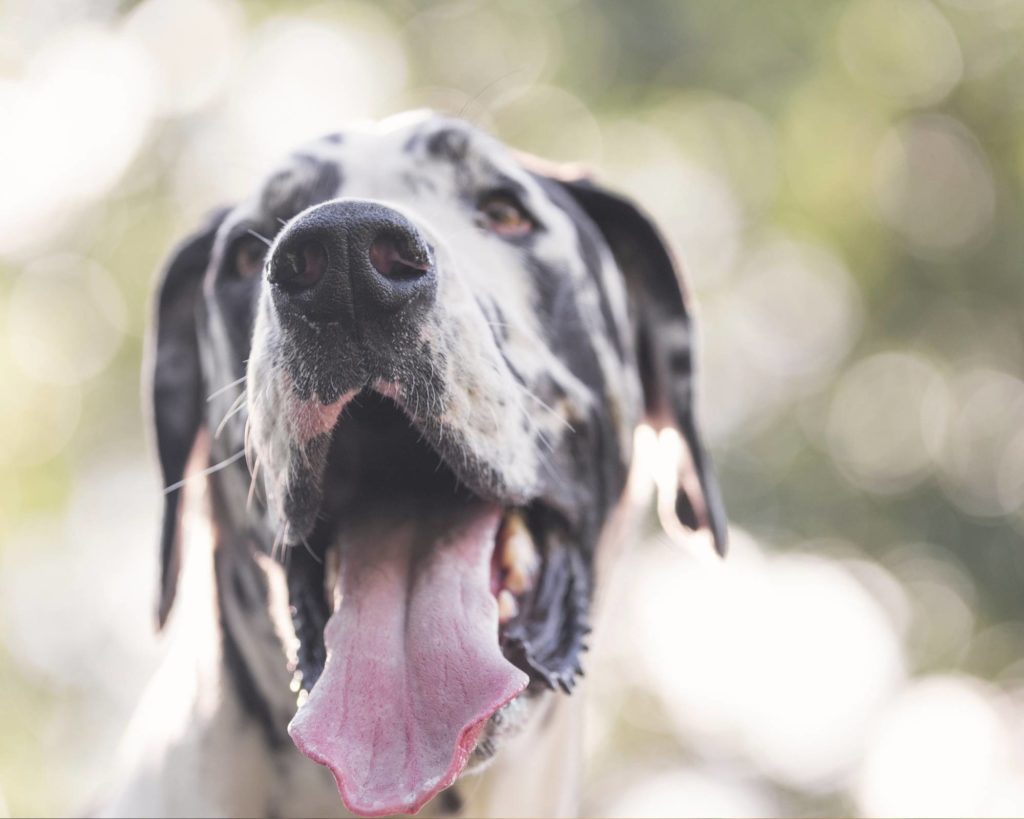
Bloat GDV Risk Reduction
Let’s dig into this a little further!
It’s critically important when purchasing a Great Dane puppy from a breeder that your breeder can prove that the pedigree is free of bloat, DCM, and unstable temperaments.
Use modern training and socialization methods to help your dog develop a stable, friendly, and confident temperament. Work with a trainer if your dog experiences anxiety, fearfulness, or shows aggression. Our popular Great Dane early socialization guide can help!
Talk to your veterinarian to address issues with gut health. There are many things that cause chronic loose stools in Great Danes including poor quality food, unbalanced nutrition, low fiber diets, adult foods fed to puppies, overfeeding, health problems, and parasites.
Feed a dry kibble that contains rendered meat meal and balanced protein, fat, carb, fiber, calcium, phosphorus, and vitamin D ratios.
Do not feed grain-free or poorly researched kibble foods from brands with a small market share.
Add balanced canned, fresh, or raw food toppers to the kibble, and feed 2-3 small, stress-free meals each day.
Remember to keep toppers balanced. If they cannot be served as a fully nutritious meal, they are considered treats and should be less than 5% of overall intake.
Lastly, consider a preventative Gastropexy for your Great Dane. This simple procedure can help keep the stomach from flipping (also called torsion) and save your dogs life if bloat were to occur. Statistics show much better outcomes for dogs who have had a Gastropexy.

Leave a Reply